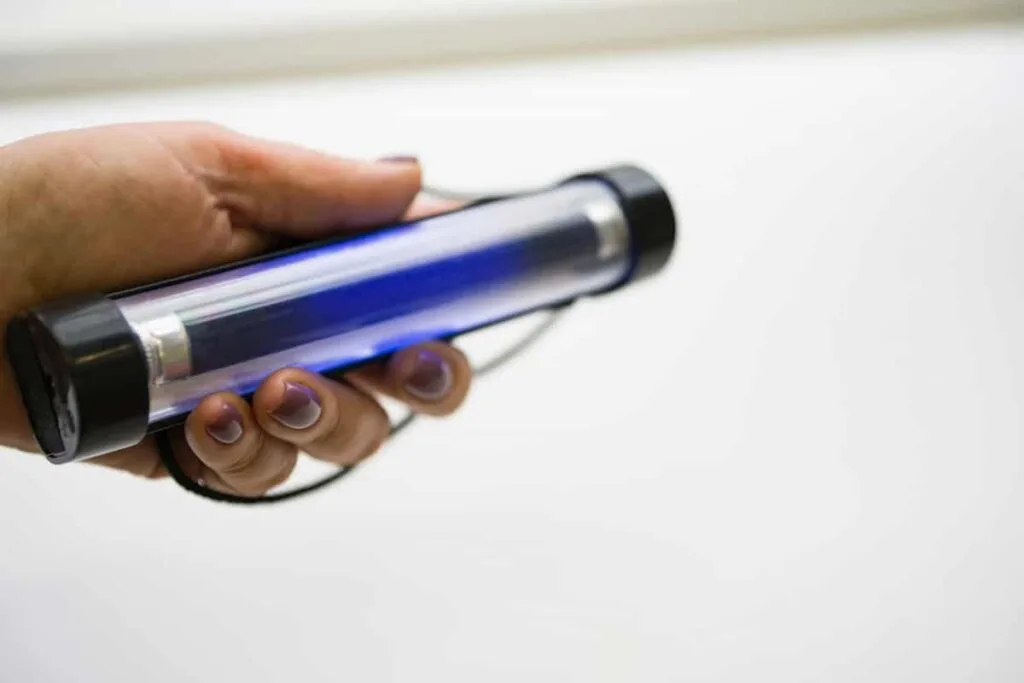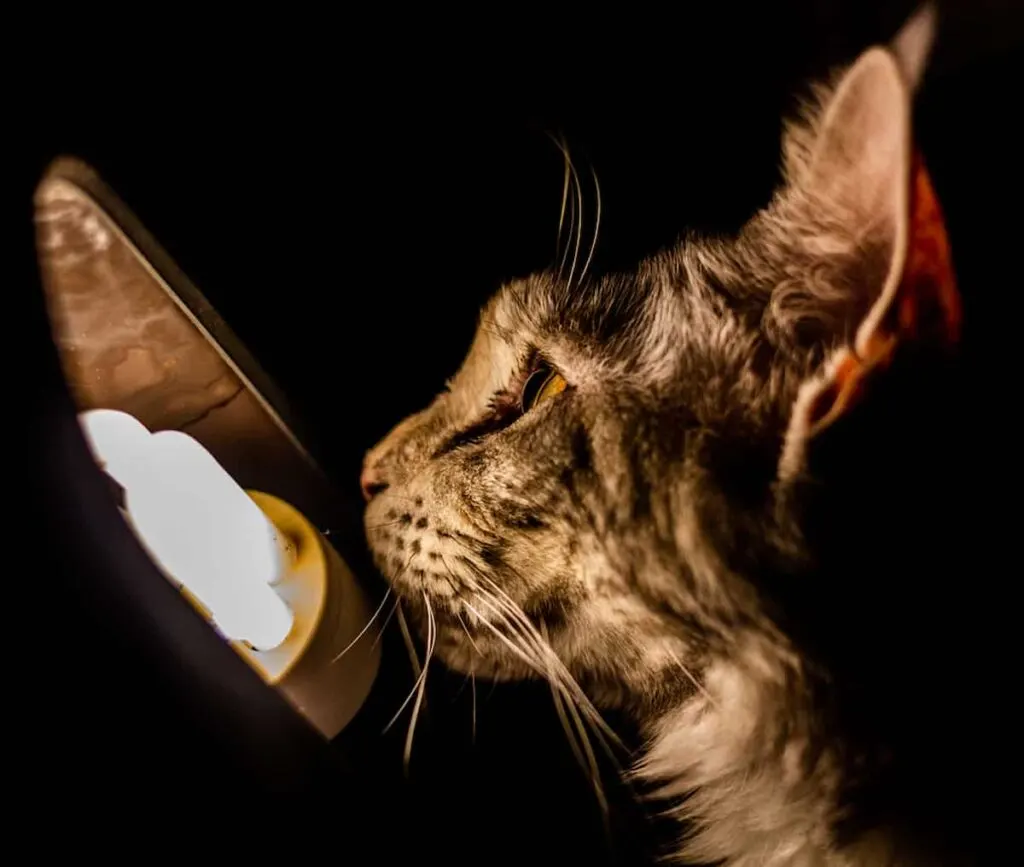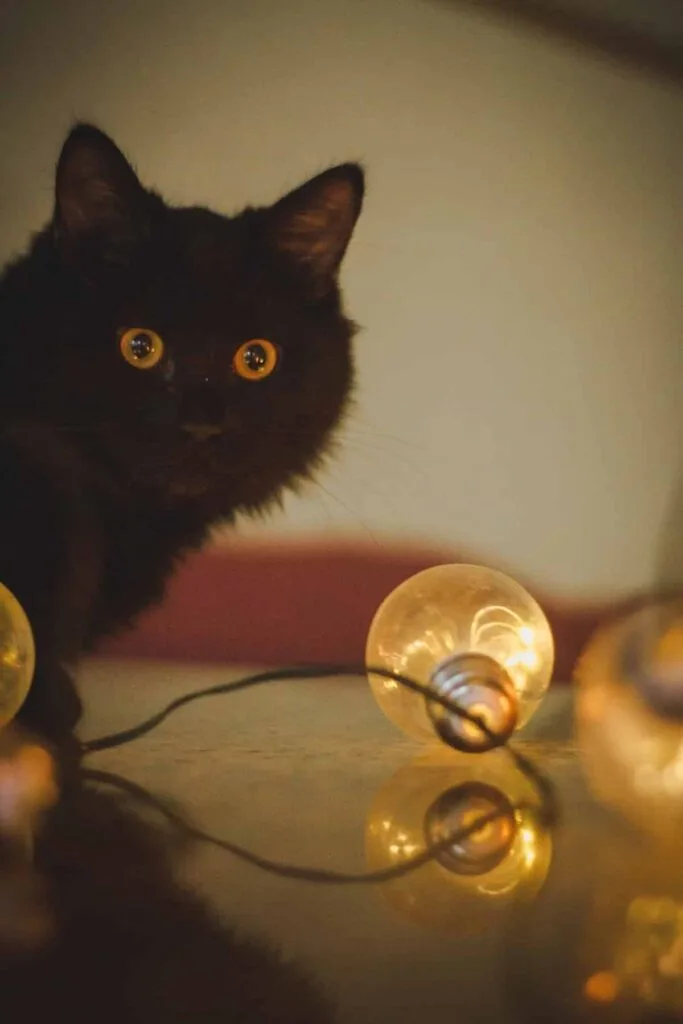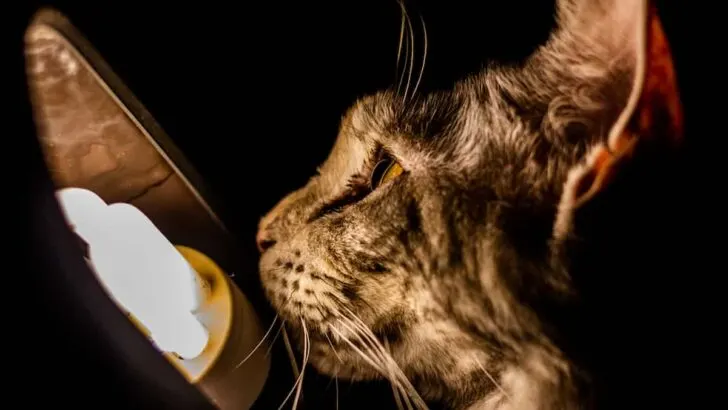Many people now favor black lights as a lighting alternative. They are used to emphasize particular items or features and to create a distinctive environment. If you have a cat, you might wonder whether your feline companion appreciates black light as much as you do.
Do cats enjoy black light, then? Cats can be attracted to black light due to their ability to see it well. They can see in low light conditions and have stronger night vision than humans. Cats however should not look direclty into black light as it can damage their vision.
Although cats might not appreciate black light, ensuring they are secure around it is still necessary. A cat’s eyes may suffer if they are exposed to ultraviolet light. Hence, it’s crucial to use black lights responsibly and ensure your cat doesn’t spend too much time under them.

Black Light: What Is It?
Before we get into how cats can react to blacklight, its important to undertand exactly what it is. That’ll give you a better picture of whats going on here.
So, black light emits ultraviolet rays and is also referred to as UV light. Although it cannot be seen with the human eye, this light makes some materials glow or fluoresce. You can find it in many forms too such as a lightbulb in a room, or even in flashlight style. They’re easy to get a hold of and relatively inexpensive.
Black lights are frequently employed in theaters, nightclubs, and other entertainment venues to create a distinctive mood. These are not usually locations a cat would frequent, however if you’ve got a special guest room, or den or entertaining space in your home, its actually quite plausible.
Moreover, black lights are employed in scientific studies to examine the behavior of some creatures, including insects and birds, that are UV-sensitive.
Black lights can, however, be dangerous to people and animals if exposed to them for an extended period. UV radiation, which black lights emit, can damage a cat’s eyes if exposed for an extended period.
If you must use a black light near your cat, keep the light at a safe distance and minimize their exposure.
Is Black Light Visible to Cats?
UV radiation, which black lights emit, can damage a cat’s eyes if exposed to it for an extended period. Cats’ cornea and retina can be harmed by UV rays, resulting in vision issues or even blindness.
Cats can see in the dark, although they are not as sensitive to black light as we are. Compared to humans, cats have a wider field of vision and can perceive some colors that we cannot, such as ultraviolet light. However, this does not imply that cats like or are drawn to black light.
It’s crucial to remember that cats have delicate eyes and are susceptible to being startled by bright or flashing lights. It is best to first speak with a veterinarian to ensure that utilizing a black light around your cat is safe for your pet.

What Responses Do Cats Have to Black Light?
Cats have significantly better night vision than humans and can see in much lower light levels. Ultraviolet (UV) light, which is invisible to humans, can also be seen by them.
UV radiation, which black lights emit, can damage a cat’s eyes if exposed for an extended period. The cornea and retina of a cat’s eyes could be harmed by prolonged UV exposure, resulting in blindness or vision issues.
Cats can perceive UV light, although it’s unclear whether they like it. While some cats might not like black lights, others might be scared or agitated by the strange light source.
Black lights may appear a different color to cats than to people, which could be confusing or alarming.
It’s crucial to remember that cats are unique creatures, meaning their responses to black lights may differ. While some cats might be drawn to the new light source, others would completely shun it.
To assure their security and comfort, black lights should be introduced to cats gradually and under close supervision, as with any new experience.
Can Black Light Impact the Health of Cats?
Black lights are common for finding pet pee stains, looking for fake cash or identification, or even setting a fun mood at gatherings. However, pet owners might question whether black lights can harm their cats’ health.
Cats can generally be around black lights. Remembering a few things is vital to protect your cat’s safety.
Avoid shining the black light into your cat’s eyes directly. Cats are susceptible to UV eye damage, just like people. Prevent prolonged black light exposure, especially in kittens.
Make sure your cat doesn’t consume anything that glows in the dark. Some materials, such as plastics or glow-in-the-dark toys, can be harmful when swallowed.

Any urine or other stains are seen under a black light should be removed quickly and thoroughly. If left untreated, urine stains can harbor bacteria and harm your cat’s health.
It’s also crucial to remember that not all cats will love being exposed to dark light. Different cats have varied personalities and tastes; some could feel anxious or uneasy under the strong light.
It is advised to refrain from utilizing black lights near your cat if you observe that they are showing signs of stress or pain.
In conclusion, as long as you take the essential procedures to ensure your cat’s safety, black lights are generally safe for cats. Keep children away from potentially harmful items, avoid shining the light directly into their eyes, and quickly clean up messes.
Furthermore, remember that it is preferable to refrain from using black lights completely if your cat appears uneasy or stressed around them.
Final Thoughts
According to the studies and data, cats are not particularly fond of black light. They can see in dim light and have great night vision, but black light does not improve their vision.
It could even frighten some cats because it might draw attention to filth or stains that aren’t apparent in natural light.
It’s crucial to remember that each cat is unique; some might enjoy playing or relaxing in a room with a dark light, while others would not. Introducing a new setting or experience gradually and watching your cat’s behavior and response is advisable.
Using black light ethically and properly is also vital. Although it can be useful for locating specific things or chemicals, extended exposure to black light can be dangerous for both people and animals.
It is advised to utilize black light sparingly and carefully.
In conclusion, even if black light might not greatly affect a cat’s preferences or behavior, it’s still critical to consider their particular needs and safety when introducing them to novel situations or encounters.

My name is James, and welcome to FAQCats!
Along with our team of cat owners, expert pet enthusiasts, and pet professionals, we aim to write engaging helpful, engaging content about cats. At FAQCats we strive to provide content that’s accurate and fun to read. Our team writes about everything related to cats; even the most complex of topics. Through extensive research and caring for our own fur-pals, we’re able to provide something cat owners worldwide will love. Have a look around, and leave us feedback anytime!

